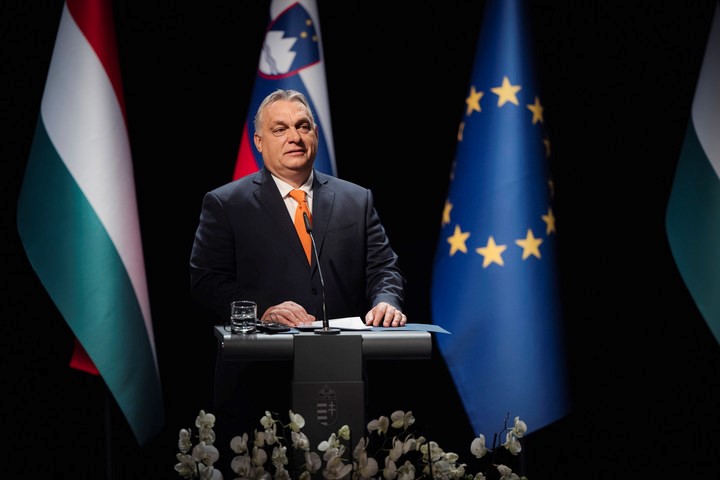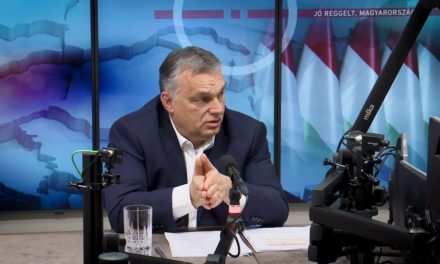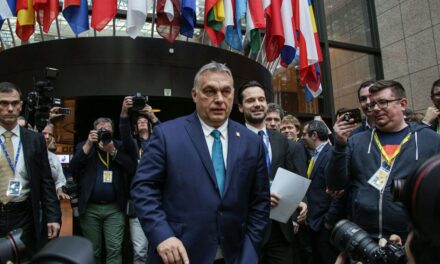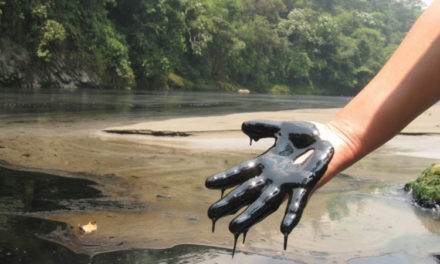The Hungarian and Slovenian economies are coming out of the crisis stronger than when they entered it, and there are few such countries - Prime Minister Viktor Orbán said on Monday at a joint press conference with Slovenian Prime Minister Janez Jansa in Lendvá, Slovenia. At the event, the Slovenian Prime Minister emphasized that the signed Hungarian-Slovenian agreement forms a bridge to wider cooperation, and that bilateral relations can be further built on the basis of it.
The Prime Minister met with his colleague, Slovenian Prime Minister Janez Jansa, and they signed an agreement on the development of the Mura and Rába regions. At their joint press conference, Viktor Orbán said: the epidemic has plagued Hungary and Slovenia as well, but overall they are among the countries that have successfully defended themselves.
Viktor Orbán called the signed agreement important because, in his opinion, it is good not only for the people who live here, but also for all Slovenians and Hungarians, because it strengthens the friendship and alliance between the two countries.
"We live in such times and we will live even more in such times" when friendship will be the most valuable currency and sincere friendship, the historical community of destiny, will be the most valuable thing.
He sees that they will face many challenges in the future, such as the Russian-Ukrainian conflict and the reorganization of the world economy, which is taking place to the benefit of the East and to the detriment of the West. "It will be easier to find the answers together than separately," he declared. Viktor Orbán emphasized: the situation in Europe has changed. A few years ago, we thought that Central Europeans could not function without Western economies, and this may still be true now, but it was supplemented by the truth that Western Europeans could no longer function without Central European economies.
The prime minister elaborated on this: Slovenians and Hungarians see the minorities living in each other's territory not as a conflict, but as a resource, these communities "add to our strength" and make Slovenia and Hungary stronger.
In response to a question, he explained: the Slovenian EU presidency did everything in the second half of the previous year to warn the European Union in time that "an increase in energy prices is knocking at the door for which we are not prepared". The other countries of Central Europe also said that this would be a big problem, he added.
He emphasized: it is not just that the price of energy has gone up, but that the European Union's climate policy has failed. A new plan is needed, because if the old one is enforced, the next step is to raise the price of energy for cars and apartments. We will "fight" to prevent this from happening. He reminded: In Hungary, families are protected by reducing utility bills, but businesses suffer because of energy prices, because the Hungarian budget can no longer support the same protection system, so that companies also apply a fixed price.
Regarding the situation in Ukraine, he said: the goal is to avoid war, that is, to maintain peace . declared , "it is not enough for a person to declare his intention for peace, "peace requires strength, there is no peace for the weak"
He believed that "we are not doing well in this", because Europe does not have a military force that can be compared to the Russian one, and as long as this is the case, "the security of Europe will not be decided by the Europeans, but by the Russians on one side, and the Americans on the other side ” he explained.
He said: That is why Hungary supports those European efforts that want military cooperation between the EU member states, that want to develop the defense industry, and that want to build a serious European defense capability for the sake of peace. The Prime Minister emphasized:
Ukraine is a neighbor of Hungary, so if the situation there worsens, "Hungary will come under enormous pressure."
Tens of thousands of refugees came to Hungary in the 1990s, during the Yugoslav war, but Ukraine's population is much larger than the former Yugoslavia, so if there is trouble there, the security and economic weight of the refugee pressure on Hungary will be much greater, he said.
When asked about the upcoming election, the prime minister explained: "we are preparing for victory", "we have the arguments" for continuing to govern, and we also have the political, economic and moral foundations, because in the last twelve years Hungary "has come a long way and moved forward, even ran forward", looks completely different than twelve years ago. "Referring to this performance, we asked for the trust of the Hungarians," he said.
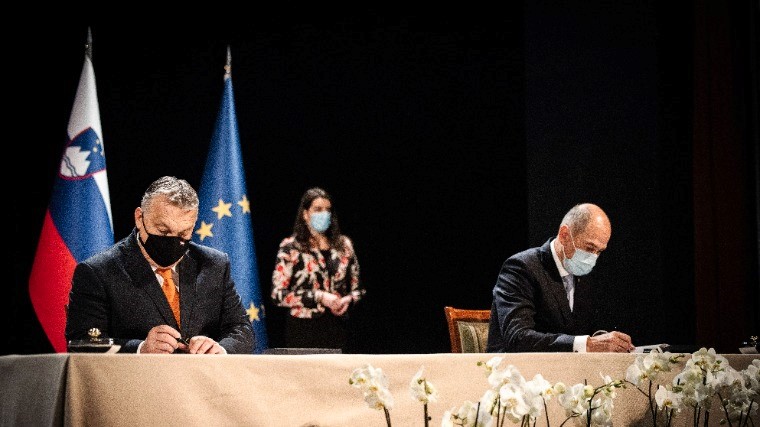
Prime Minister Viktor Orbán and Slovenian Prime Minister Janez Jansa sign the agreement on a common fund for the development of the Mura and Rába regions in Lendvá. Photo: MTI/Prime Minister's Press Office/Zoltán Fischer
The Slovenian Prime Minister reminded: 30 years have passed since the two countries signed the first agreement on the protection of minorities living on both sides of the border. With the current agreement, the arrears will be paid off, he added. He indicated that the growth of trade between the two countries last year was 20 percent more than the previous year, "which indicates that entrepreneurs on both sides of the border have discovered opportunities that have not been exploited so far."
Hungary is currently Slovenia's seventh foreign trade partner, and Jansa expects that this will change in the future, since they are two neighboring countries, and according to him, "economic relations between neighboring countries are twice as useful."
The Slovenian Prime Minister reminded that elections will be held in both countries in April, but he is confident that the cooperation between the two countries will continue, "regardless of what awaits them after the elections".
In his answer to a journalist's question, Jansa also addressed the issue of the energy crisis.
As he said, without nuclear energy, it is not possible to talk about reducing energy prices. He believed that they were successful in that "most people chose common sense" in the European Union. Regarding the crisis in Ukraine, he said: "I think I can say on behalf of both of us that we trust that the conflict will not escalate, because in the end no one benefits from that."
There is a general consensus in the EU that a peaceful solution should be sought. No one supports a war that cannot be won. If someone thinks that they can win a war, they are wrong, underlined the Slovenian prime minister. At the same time, he warned that a hybrid attack can also cause great damage, even if there is no real armed conflict.
Source: MTI/Hirado.hu

